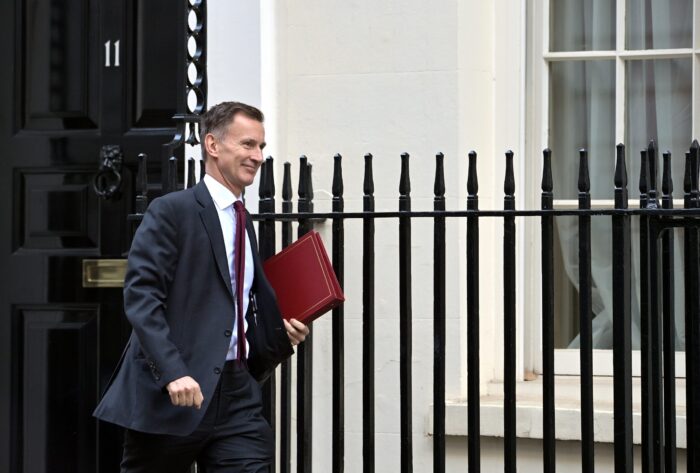Jeremy Hunt will announce the Government's plan for the UK economy in just under two weeks’ time. On 6 March, the Chancellor will outline everything that’ll impact savers, borrowers, workers and retirees, with rumours abound as to what will be included.
Predictions have been swirling over whether the Chancellor will go all in with tax breaks, perks and benefits for homeowners and workers to secure a Conservative victory at the general election.
Meanwhile, other commentators suggest the Government can’t afford to be too generous to meet fiscal targets.
We’ve rounded up what the experts suggest is likely to make it into Hunt’s red briefcase come next month.
Low-deposit 99% mortgages
One of the major changes for potential homebuyers could be the introduction of low-deposit mortgages.
Last month, the Government hinted at plans for 99% mortgages, as part of some potentially ambitious plans targeting first-time buyers.
Daniel Austin, CEO and co-founder at ASK Partners, thinks this is a positive step for the housing market and for renters struggling to save up for a deposit.
Austin said: “It will serve to reinvigorate the first-time buyer market, consequently driving more turnover of properties higher up the chain. With rental prices so high, it can be hard to save for a meaningful deposit but those managing the rents would find it easier to make monthly mortgage payments.
“This will be very welcome news for a generation of renters with no access to the bank of mum and dad, who might now have a chance of home ownership, and for developers who we saw benefit from the previous Help to Buy scheme.”
Karen Noye, a mortgage expert at Quilter, was more cautious of the potential policy.
She said: “In terms of house prices, the introduction of a 99% mortgage scheme could cause a rush of people looking to buy homes at a time when there is very limited supply. This could push house prices up as prospective buyers compete for homes, only adding to the current issues surrounding supply, demand, and affordability.”
Noye added: “While the introduction of a 99% mortgage might be well-meaning, there could be some serious ramifications if the housing market cools as expected in the coming months and years, and potential buyers would need to weigh up the risks of using it at a time when the outlook for the property market is somewhat uncertain.”
Tax cuts
Tax cuts have been suggested as a way of winning back voters ahead of the Chancellor’s second Budget, but the chance of huge cuts being announced is diminishing, experts suggest.
One example is income tax. The Government had previously hinted a 2p tax cut could be part of his economic plans, but Sarah Coles, head of finance at Hargreaves Lansdown, believes the chances of that happening are now looking “distinctly unlikely”.
Coles said: “Instead, Hunt could opt for a smaller 1p cut, and he might choose to cut National Insurance rather than income tax, on the grounds that it’s cheaper.”
According to Coles, inheritance tax cuts could meet the same fate, despite Coles saying it is “a kite flown more times than a Mary Poppins prop.”
The finance expert said: “There’s every chance that this will be considered a cut too far at a time like this, especially given that it’s only paid by around 4% of estates. There’s also the risk it could reduce the incentive to give gifts across the generations during our lifetimes, so we may well see this shelved.”
However, Rachael Griffin, tax and financial planning expert at Quilter, thinks the fact the Conservatives are lagging behind in the polls could play a part in fuelling cuts.
Griffin said: “Given the pressures on households, rumours suggest the Government is considering a further cut to either income tax or National Insurance during the Budget.
“Polls suggest the Conservatives are struggling, so we can expect they will pull out all the stops at the Budget in an attempt to sway voters as we near the election. Should a further cut materialise as part of this, we could see tax revenues fall considerably.”
Stamp duty cuts
Recent data from Coventry Building Society found many buyers had to borrow extra on their mortgage to afford their stamp duty charge.
However, cuts are not predicted by Sarah Coles, who feels any reductions “were always going to be tricky because we’re in the middle of a stamp duty holiday at the moment”.
She said: “Making that holiday permanent wouldn’t make people feel any richer, so to have an impact, Hunt would have to go further, which would be an expensive move when he has such little fiscal headroom to manoeuvre within.”
Fuel duty
After a period of consistent dips, petrol prices have started to creep up again, but a freeze or cut to fuel duty could be on the cards. Coles said: “There won’t be much of a reaction if Hunt keeps the 5p fuel duty cut that was meant to be temporary, or if he freezes the fuel duty instead of hiking it as scheduled.
“However, if he doesn’t do either, it’s going to hit motorists hard, and leave a large number of voters out of pocket.
“The freeze wasn’t priced into the Autumn Statement maths – which raises the risk it will be ditched. However, there’s a chance Hunt left it out in the hope the maths would alter in his favour between then and now. He could find himself with little alternative than to keep duty where it is for now.”
British ISA
British ISAs have made it onto the rumour mill – an additional ISA allowance specifically for investment in British companies.
Susannah Streeter, head of money and markets at Hargreaves Lansdown, thinks British ISAs could be good news for UK companies. She said: “The economy is clearly in need of an injection of investment to help drag economic growth out of a stupor, and investing in Britain could be a central plank of the Budget announcement.
“Some tweaks to existing rules and planned changes could go a long way to supporting this aim. Halting planned cuts to dividend tax and capital gains tax allowances could help support investors to make the most of their commitment to British firms.”
She added that cutting stamp duty on share purchases would also ease the burden on investors.
However, she’s concerned that the financial state of the nation could impact this potential move.
Streeter added: “Mooted plans for a British ISA are more worrying. They could add unnecessary complexity, could fail to achieve their aims, and could have a negative impact on UK investors. A separate British ISA might end up providing no additional boost to UK investment.”
Ed Monk from Fidelity International thinks it might not be a guaranteed inclusion in Hunt’s announcement.
Monk said: “Reports so far have suggested any such plans are only at an early stage. One key question would be whether a chunk of the existing £20,000 is carved out and dedicated to UK-specific investments, or whether a new allowance is provided.”
Lifetime ISAs
Helen Morrissey, head of retirement analysis at Hargreaves Lansdown, thinks the Government ought to make changes to Lifetime ISAs (LISAs) to “support retirement investing” for self-employed workers.
Morrissey said: “We want to see the Government open up LISAs to people aged up to 55 – to both open them and pay into them. This would make them available to a whole new tranche of people who are chronically low on savings for retirement.
“Added to the removal of the penalty for early emergency withdrawals, this would tailor them to the needs of the self-employed, and help boost retirement savings for a group who are alarmingly under-pensioned.”





